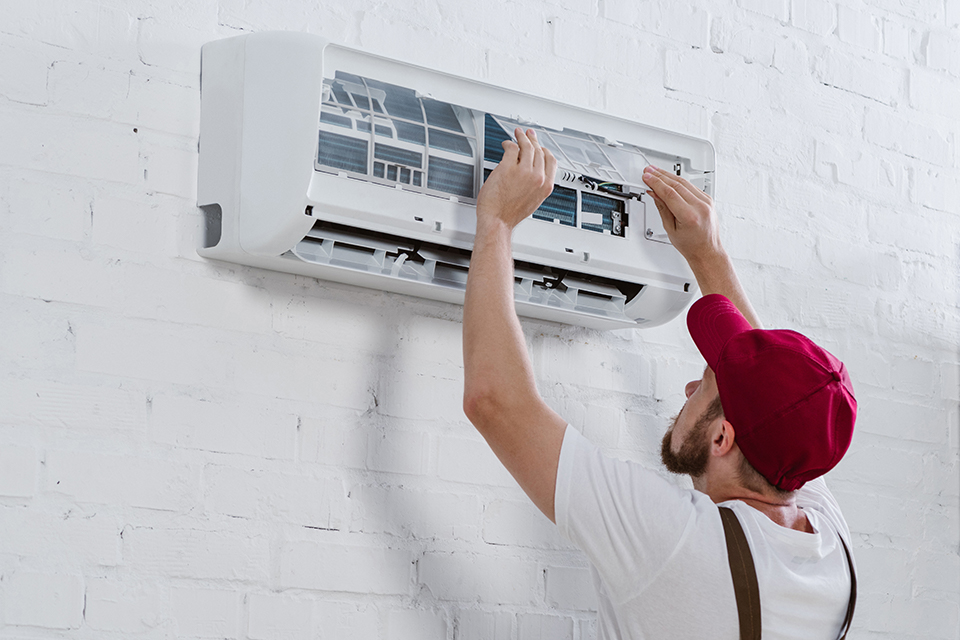
How to Clean an Air Conditioning Filter
June 20, 2022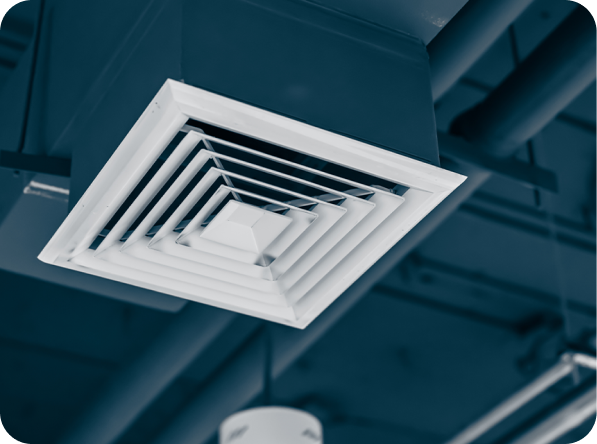
What is Ducted Air Conditioning?
November 18, 2022Gas vs Electric Heating

As the cold Victorian weather approaches, you may be wondering if your heater will keep you warm throughout the chilly days.
Heating your home can look different depending on many factors, such as the size of the rooms and the energy sources available to you: gas or electricity.
Gas heaters work by burning natural gas or liquified petroleum gas (LPG) to produce heat. This process can vary in terms of ventilation and heating between different systems, but at its core is dependent on the use of gas as fuel. Alternatively, electric heaters transfer electrical currents into heat using various parts such as compressors and underfloor wiring. This article will explore the various types of gas and electric heating options you may consider and how to get the best value for money when choosing a solution for your home.
Types of Gas Heaters
There are many different heating options you can choose from, whether you’re interested in a central heating installation or simply heating a single space. Read on to learn about gas ducted, hydronic and room heaters.
Gas ducted heating
Gas ducted heating uses an external furnace paired with a ducting system installed in the walls and floors to heat numerous rooms quickly. Using temperature controls, this system can be paired with a split system setup to enable dual heating and cooling.
This energy-efficient heater provides near-instantaneous heating and allows homeowners to create zones within their homes. Zoning lets homeowners adjust the temperature of different rooms to suit their needs or energy consumption.
Gas hydronic heating
Gas hydronic heating is better suited to new homes due to retrofitting challenges and uses radiant heat from a warmed piping system to heat your home. These installations can cost more at first but are ultimately cheaper to run than their gas ducted heating counterparts.
This minimalistic and quiet heating system forgoes noisy fans, reducing the circulation of allergens within the home and heating your home in a comfortable and energy-efficient way. Read more about hydronic heating here.
Gas room heaters
Gas room heaters come in two types: convection and radiant convection. Convection heaters work much like a small scale ducted system, blowing hot air into the room. Alternatively, radiant convection works similar to hydronic heating, using radiant heat combined with the heated air.
The major downside to these heaters is that they are not a household solution and can only heat one room. Victorian installation restrictions on unflued gas heaters also dictate that an unflued gas heater may only be installed when replacing a pre-existing unflued gas heater.
Choosing between the three gas heating types comes down to a few significant factors:
Is your house old or new?
Retrofitting a hydronic heating system will be difficult and costly if your home is old, whereas a ducted system will be more straightforward.
Do you want to zone your heating?
Gas ducted and hydronic heating lend themselves best to a zoned heating system. While gas room heaters can heat a single room, flued gas heaters aren’t portable, meaning this system is unsuitable for an entire household solution.
Do you have allergies?
If yes, hydronic heating can limit the movement of airborne allergens and irritants.
Are you sensitive to noise?
A gas ducted heating system requires air to be blown throughout a series of ducts, with a higher noise level than a hydronic system. Read more about how hydronic heating fairs when compared to ducted heating here.
Do you want dual heating and cooling?
A gas ducted heating system offers pairing with split system functionality to enable both heating and cooling using the ducted system. This functionality is especially beneficial in more unpredictable weather conditions.
Through discussion with our expert installation team at SimplyAir, you can learn more about which system is most suitable for your needs.
Types of Electric Heaters
SimplyAir also offers a variety of electric heaters suitable for numerous living situations. Our team can provide electric heating options for the previously mentioned hydronic and ducted systems as well as multiple home and room solutions, including:
Multi-head split system
Mounted via wall, ceiling or floor; multi-head split systems use multiple indoor units connected to an outdoor condensing unit. These indoor units then feed hot or cold air into a household. These units can be independently operated and supply the household with zoning functionality.
Multi-head split systems are useful for households with limited outdoor spaces. They use only one outdoor unit and can be installed using seamless ducting.
Single-head split system
A single-head split system operates like a multi-head system but is fed through one indoor unit. These systems are preferential when heating or cooling a single small or large room.
Panel heating systems
A panel heating system is completely hidden for the ultimate minimalistic home system, with electric panels providing consistent heat from under the floor. Panel heating systems can also be wall-mounted over the floor and forgo hot blowing air, preventing the risk of airborne allergens.
Choosing which electric heating system is right for you will, similarly to gas heating, depend on your lifestyle preferences regarding retrofitting, zoning, allergy protection, noise pollution and dual heating and cooling functionality.
Energy Ratings
Understanding energy ratings is the most important part of choosing an energy-efficient heater. The Energy Efficiency Labelling Scheme provides a Star Rating to provide test-based efficiency ratings; this Star Rating is primarily based on the thermal efficiency of the heater. These labels consist of three major types, the ZERL (Zoned Energy Rating Label), the Energy Rating Label and the Gas Energy Rating Label.
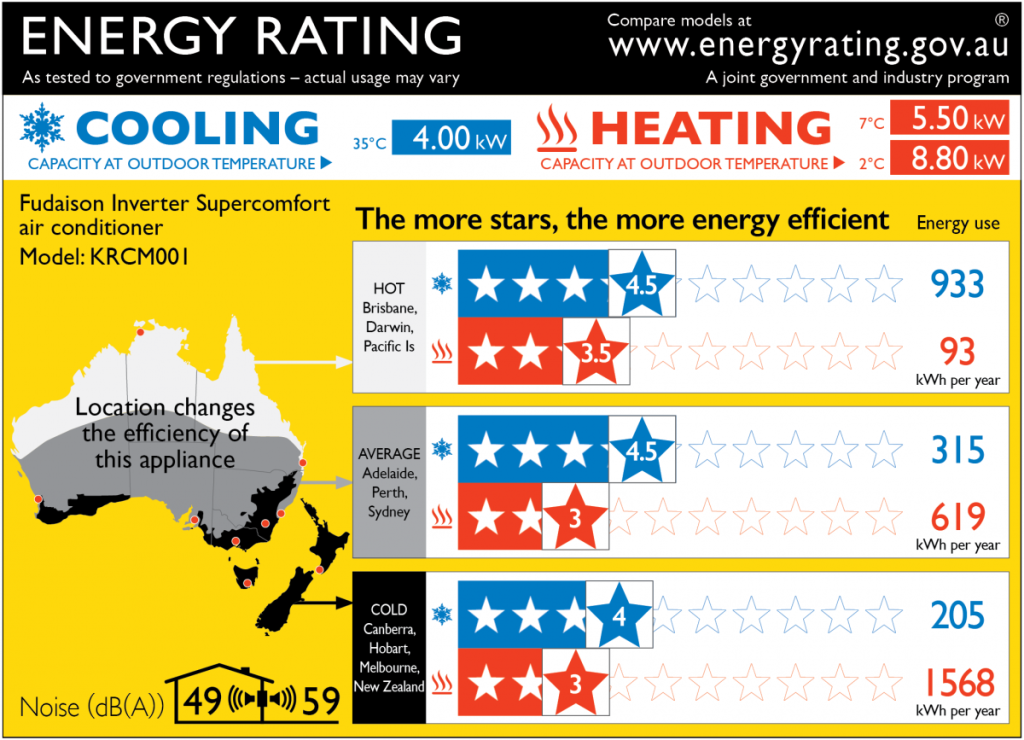
In March 2019, the ZERL (shown above) was introduced for heaters and air conditioners, showing climate ratings for three different zones in Australia. Additionally, the standard Energy Rating Label has been adapted to display both figures for some dual systems, as shown below in Image 2. Both of these labels are easily interpreted using the Energy Rating Calculator tool.
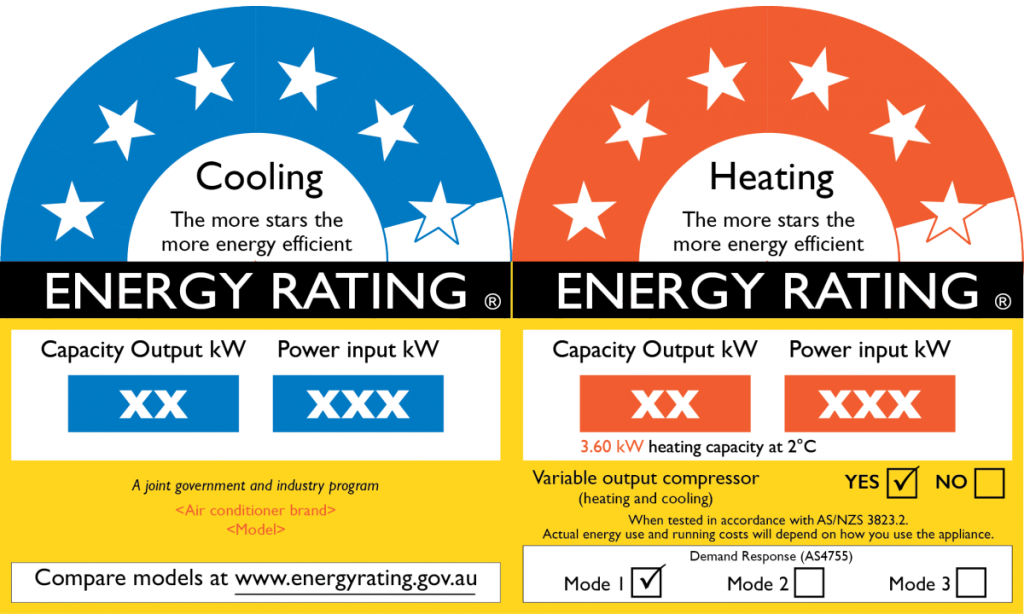
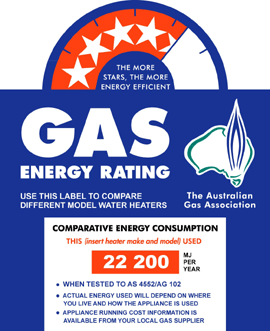
Gas heaters have a slightly different label known as the Gas Energy Rating, shown in Image 3. Interpreting this label can be done with the following table:
Gas Energy Rating |
Thermal Efficiency |
| 1.0 | 61% |
| 1.5 | 64% |
| 2.0 | 67% |
| 2.5 | 70% |
| 3.0 | 73% |
| 3.5 | 76% |
| 4.0 | 79% |
| 4.5 | 82% |
| 5.0 | 85% |
| 5.5 | 88% |
| 6.0 | 91% |
This data means that if you have a system rated at 1 star and spend roughly $450 per year on gas to run it, a 5.0-star gas heater should save you the difference in thermal efficiency. You can calculate this difference by subtracting the efficiency of a 1.0-star heater from a 5.0-star heater (85 – 61), resulting in a 24% efficiency difference. A 5.0-star heater would save you 24% of your $450 bill (450 x .24), resulting in $108 per year savings.
Once you know how to read Star Ratings, you can better compare not only heaters and air conditioners but all types of household appliances. However, ultimately, it all comes down to what kind of energy your appliance uses – gas or electricity?
Is Gas Cheaper than Electricity?
At a glance, gas is cheaper than electricity when considering pure running costs; however, things can get a bit more complicated. According to Canstar Blue, at a 25c/kWh electricity rate and 4c/MJ gas usage rate, a 2.4kWh heater costs 60c per hour whilst the equivalent 13MJ heater costs 52c per hour. It’s important to remember that these figures are purely estimates, and running costs can vary depending on your state and distribution rates. Additionally, whilst gas heaters are highly efficient for small to medium-sized rooms and are cheap to install, they also cost more for the system’s purchase. Finally, electric heaters often have a wider range of types available, resulting in the selection of more energy-efficient models.
Which Heater is Best?
Choosing the best heater depends on numerous factors and will ultimately impact your heating costs for years. Each system has its pros and cons, so instead of deciding for you, we’ll outline where each type of heater performs best and worst:
System Type |
Pros |
Cons |
Ducted heating |
Available using both gas and electric fuel types, with gas generally the cheaper and faster acting option. Electric heating is more eco-friendly.
Allows household zoning. |
High airspeed increases the prevalence of allergens.
High airspeed increases noise levels. Electric ducted heating is more costly to run. |
Hydronic heating |
Available using both gas and electric fuel types, with gas generally the cheaper and faster acting option. Electric heating is more eco-friendly.
Allows household zoning. Minimalistic aesthetic. Cost-efficient operation. |
Retrofitting is costly.
Installation costs are higher than other systems. |
Gas room heaters |
Cheaper installation than household solutions.
Fast-acting heating. High effectivity in lower temperatures. |
Single-room heating capabilities only.
Limited heater availability due to Victorian restrictions. |
Electric split systems |
Available in both multi-head and single-head systems.
Seamless ducting options. Multi-head systems maximise outdoor space. Single-head systems are useful for single-room setups. Dual heating and cooling functionality. Eco-friendly heating. |
Single-head systems can reduce access to outdoor space.
Electric heating is more costly to run. |
Electric underfloor heating |
Allows household zoning.
Minimalistic aesthetic. No blowing air, reducing the risk of airborne allergens. Eco-friendly heating. |
Electric heating is more costly to run, substantially higher than the hydronic counterpart.
Faster heat loss. |
As you can see, each heater has its benefits and whilst gas may be initially cheaper than electricity, it’s essential to consider your lifestyle and local energy rates. Some solutions may be more effective for smaller homes or a more sustainable heating setup, while others offer allergy support and quieter operation. Ultimately the decision comes down to you, but with the aid of skilled HVAC professionals, you can fully explore the options available. If you’d like some help choosing the right heating system for your home, contact us today!
 Schedule a quote
Request a callback
Schedule a quote
Request a callback

Call us Mon-Fri: 8:30am-5pm or leave us a message for a callback.
